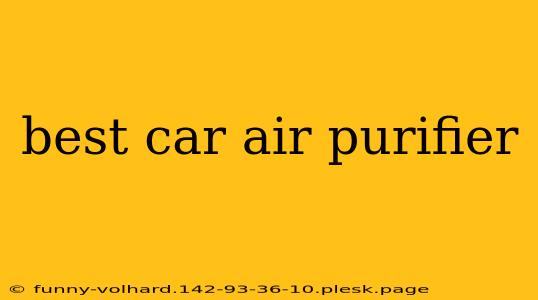Are you tired of breathing in stale, polluted air while driving? Do you suffer from allergies or sensitivities that are aggravated by car exhaust and other airborne contaminants? Investing in a car air purifier could be the solution you've been searching for. This comprehensive guide will help you navigate the world of car air purifiers, highlighting key features, benefits, and ultimately, helping you choose the best car air purifier for your needs.
Understanding the Importance of Clean Car Air
The air inside your car can be surprisingly polluted. Harmful substances like particulate matter (PM2.5), pollen, dust mites, pet dander, and volatile organic compounds (VOCs) from cleaning products and car materials accumulate, negatively impacting your health and well-being. Regular exposure to poor air quality can lead to:
- Respiratory problems: Wheezing, coughing, and difficulty breathing.
- Allergies and asthma exacerbations: Increased allergy symptoms and asthma attacks.
- Fatigue and headaches: Poor air quality can lead to reduced alertness and discomfort.
- Eye irritation: Exposure to irritants in the air can cause burning and itching eyes.
Key Features to Consider When Choosing a Car Air Purifier
Choosing the right car air purifier involves considering several crucial factors:
1. Filtration Technology:
- HEPA Filters: High-Efficiency Particulate Air (HEPA) filters are the gold standard, capable of trapping up to 99.97% of particles as small as 0.3 microns. Look for purifiers with true HEPA filters, not just "HEPA-like" filters.
- Activated Carbon Filters: These filters are effective at absorbing odors, gases, and VOCs, improving the overall air quality and eliminating unpleasant smells.
- Combination Filters: Many top-rated car air purifiers combine HEPA and activated carbon filters for comprehensive purification.
2. Coverage Area (CADR):
Clean Air Delivery Rate (CADR) measures how effectively a purifier cleans the air. Choose a purifier with a CADR rating appropriate for the size of your car's interior. Larger vehicles require purifiers with higher CADR ratings.
3. Power Source:
Most car air purifiers operate via the car's 12V DC power outlet (cigarette lighter). Ensure the purifier you choose is compatible with your vehicle's power system.
4. Noise Level:
While some noise is inevitable, opt for a purifier with a relatively low noise level, especially if you frequently drive long distances.
5. Size and Portability:
Consider the available space in your car. Some purifiers are compact and easily portable, while others are larger and more stationary.
6. Additional Features:
Some advanced car air purifiers offer extra features such as:
- Negative ion generators: These can help to reduce airborne particles.
- UV sterilization: UV light can help kill bacteria and viruses.
- Air quality sensors: These sensors monitor air quality and automatically adjust the purifier's settings.
Top Considerations for Finding the Best Car Air Purifier for YOU
The "best" car air purifier depends entirely on your individual needs and preferences. Consider the following factors:
- Your budget: Prices range widely, so set a budget beforehand.
- Your specific needs: Do you primarily need odor removal, allergy relief, or general air purification?
- Your car's size: A larger car will require a purifier with a higher CADR rating.
- Your personal preferences: Factors like noise level, size, and additional features will play a role in your decision.
Conclusion: Breathe Easier on Your Next Drive
Investing in a high-quality car air purifier can significantly improve your driving experience and enhance your health. By carefully considering the factors outlined above, you can choose a purifier that effectively cleans the air in your car, ensuring a cleaner, healthier, and more comfortable ride. Remember to always refer to the manufacturer's instructions for proper use and maintenance of your chosen purifier.

